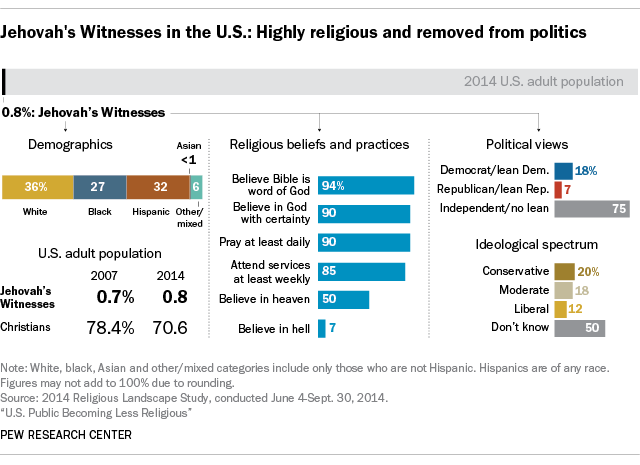
The death of superstar musician Prince has prompted many reflections on his life – including his religious faith. Prince, who was raised as a Seventh-day Adventist, became a Jehovah’s Witness as an adult and attended services in his home state of Minnesota.
Jehovah’s Witnesses, who make up just less than 1% of U.S. adults, are known for their door-to-door proselytism. But members of this denomination, which has its origins in 19th-century America, are also unique in many other ways. Here are a few facts about Jehovah’s Witnesses in the United States today, based on Pew Research Center’s Religious Landscape Study:
Demographics
Jehovah’s Witnesses are among the most racially and ethnically diverse religious groups in America. No more than four-in-ten members of the group belong to any one racial and ethnic background: 36% are white, 32% are Hispanic, 27% are black and 6% are another race or mixed race.
Most Jehovah’s Witnesses – roughly two-thirds (65%) – are women, while only 35% are men. Christians worldwide are more likely to be women than men, but this gender gap is particularly large in the context of U.S. Christian groups. For instance, 54% of U.S. Catholics are women.
Compared with other U.S. religious groups, Jehovah’s Witnesses tend to be less educated. A solid majority of adult Jehovah’s Witnesses (63%) have no more than a high school diploma, compared with, for example, 43% of evangelical Protestants and 37% of mainline Protestants.
Jehovah’s Witnesses have a low retention rate relative to other U.S. religious groups. Among all U.S. adults who were raised as Jehovah’s Witnesses, two-thirds (66%) no longer identify with the group. By contrast, about two-thirds of those who were raised as evangelical Protestants (65%) and Mormons (64%) still say they are members of those respective groups.
On the flip side, about two-thirds (65%) of current adult Jehovah’s Witnesses are converts – like Prince, they were raised in another faith.
Religious beliefs and practices
Jehovah’s Witnesses identify as Christians, but their beliefs are different from other Christians in some ways. For instance, they teach that Jesus is the son of God but is not part of a Trinity.
By traditional measures of religious commitment, Jehovah’s Witnesses are one of the most highly religious major U.S. religious groups. Nine-in-ten Jehovah’s Witnesses (90%) say religion is very important in their lives, while similar shares say they believe in God with absolute certainty (90%) and that the Bible is the word of God (94%).
Our survey found at least two other interesting ways in which Jehovah’s Witnesses stand out in their beliefs. For one, while half of Jehovah’s Witnesses say they believe in heaven, very few (7%) say they believe in hell, the traditional image of which is challenged by the denomination’s teaching. The share of all U.S. Christians who believe in hell is 10 times larger (70%). And most Jehovah’s Witnesses (83%) say their religion is the one true faith leading to eternal life; only about three-in-ten U.S. Christians (29%) believe this about their own religious faith.
Compared with U.S. Christians overall, Jehovah’s Witnesses are especially likely to say they attend religious services at least once a week (85%, compared with 47% of all U.S. Christians), pray daily (90% of Jehovah’s Witnesses vs. 68% of all U.S. Christians) and – perhaps not surprisingly – share their faith with others at least once a week (76% vs. 26%). They also are more likely than U.S. Christians overall to participate in prayer or scripture study groups and to read scripture at least weekly, among other religious behaviors.
Social and political views
Like many other highly religious Christians, Jehovah’s Witnesses tend to take conservative positions on social issues. For example, three-quarters (75%) say abortion should be illegal in all or most cases, while similar shares oppose same-sex marriage and say homosexuality should be discouraged by society (76% each). Roughly three-quarters of Jehovah’s Witnesses (74%) also reject evolution, saying humans have always existed in their present form since the beginning of time.
But Jehovah’s Witnesses do not commonly advocate for these beliefs in the political sphere. The denomination teaches that its members should remain politically neutral and abstain from voting or participating in “any action to change governments.”
This is reflected in our polling. Three-quarters of Jehovah’s Witnesses (75%) say they are political independents who do not lean toward either major party. Half (50%) decline to answer a question about political ideology (i.e., whether they describe their political views as conservative, moderate or liberal). And most Jehovah’s Witnesses (64%), when asked if they are registered to vote, say they are not registered or decline to answer the question.
Note: The last two paragraphs under the “Demographics” section were added on April 27, 2016.



